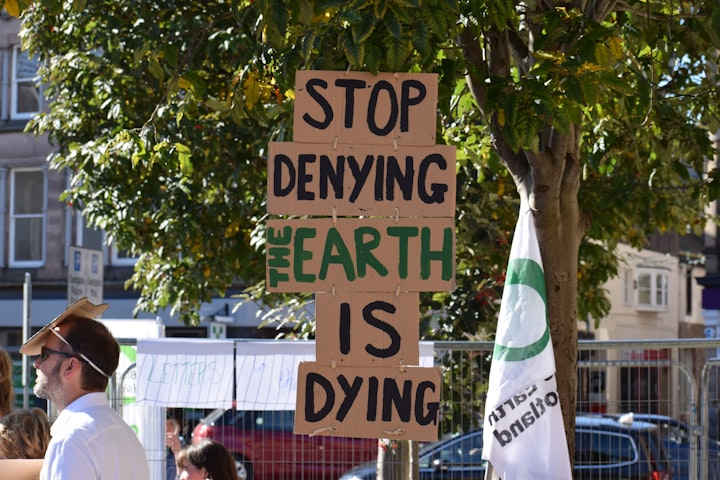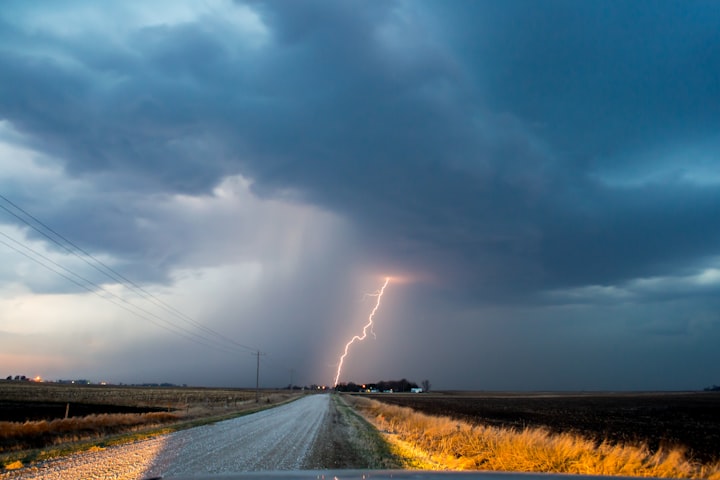Covid-19 is a Walk In The Park Compared To What’s Coming Next
Scientists warn the world is in denial about a ‘ghastly future’
The planet is in a much worse state than you thought it was. Ignorance and political inaction are threatening the very survival of life on earth. We are heading for mass extinction much earlier than anyone predicted.
Not what you wanted to hear as you sat down with your coffee to read a few articles, confidently believing in the back of your mind that COVID-19 vaccines would soon allow the world to return to ‘normal’.
But this is not science fiction. This is an international group of scientists, experts in their field, firing the starkest warning shot yet about the climate emergency — and a whole host of additional environmental challenges.
The 17 experts — 13 from the US, three from Australia and one from Mexico — published a report in Frontiers in Conservation Science on January 13, 2021, referencing more than 150 studies.
Their warning can be summed up in one terrifying sentence, which states: “The scale of the threats to the biosphere and all its lifeforms – including humanity – is so great that it is difficult to grasp for even well-informed experts.”
As the world continues to wrestle with COVID-19, the report warns that more frequent pandemics will follow unless urgent action is taken.
Mass migrations caused by climate change, declining health across the world, conflicts over dwindling resources… this is all coming our way unless we divert the danger.
Right about now is where many people stop reading, pretend it isn’t happening, convince themselves we won’t have to face these problems for decades, maybe centuries. That habit has to STOP.

Time really IS running out
The report makes it clear that we still have time to turn things around, but that time is severely limited.
It states: “Our goal is not to present a fatalist perspective, because there are many examples of successful interventions to prevent extinctions, restore ecosystems, and encourage more sustainable economic activity at both local and regional scales.
“Instead, we contend that only a realistic appreciation of the colossal challenges facing the international community might allow it to chart a less-ravaged future.”
The report pulls no punches in setting out the scale of the problem: “Humanity is causing a rapid loss of biodiversity and, with it, Earth’s ability to support complex life.
“But the mainstream is having difficulty grasping the magnitude of this loss, despite the steady erosion of the fabric of human civilization.”

Political barriers are tackled head-on, the report highlighting the rise of right-wing populist leaders and their anti-environment agendas, as seen most recently in the USA, Brazil and Australia.
The scientists lament: “If most of the world’s population truly understood and appreciated the magnitude of the crises, and the inevitability of worsening conditions, one could logically expect positive changes in politics and policies to match the gravity of the existential threats. But the opposite is unfolding.”
The report predicts: “The continued rise of extreme ideologies is likely, which in turn limits the capacity of making prudent, long-term decisions, thus potentially accelerating a vicious cycle of global ecological deterioration and its penalties.”
Support for the New Green Deal in the USA has polarised the country further still, claims the report, because environmentalism has been politicised. Look how protest group Extinction Rebellion are now considered terrorists by some countries.
Extinction Rebellion named themselves as such to play their own part in shaking and waking the world to what lies ahead.

The sixth mass extinction cannot be denied
The report highlights the International Union for the Conservation of Nature (IUCN) study, which estimates that 20% of all species are in danger of extinction over the next few decades, far and above the expected background rate.
“That we are already on the path of a sixth major extinction is now scientifically undeniable,” say the scientists.
The report highlights more stand-out warnings:
- Stopping biodiversity loss is not even close to the top of any country’s priorities, falling far behind other such concerns as economic growth and employment.
- Yet even the World Economic Forum now recognizes biodiversity loss as one of the top threats to the global economy.
- An estimated 75 percent of new infectious diseases are zoonotic in origin, directly resulting from human and animal interactions, deforestation, intensive farming, bushmeat hunting and an exploding wildlife trade.
- The global human population has doubled since 1970, reaching nearly 7.8 billion people today. By 2050, the population will likely grow to 9.9 billion. Large populations are drivers of biodiversity loss, food shortages and increased toxification of the planet due to plastic waste. A growing population also increases chances of pandemics.
- The report also points to “mounting evidence” that when populations are large and growing fast, they can spark both internal and international conflicts that lead to war.
- Large, additional commitments to those signed off at the Paris Agreement of 2016 must be made and fulfilled. If not, the projected rise of Earth’s temperature will be “catastrophic for biodiversity.”

So what do we do about it?
On a personal level, we can all be as environmentally friendly as possible, spread the word, put pressure on governments and polluting companies, use our vote wisely, always put the planet first… but of course far more needs to be addressed at higher levels.
Suggested solutions in the report are big picture ambitions:
- Fundamental changes to global capitalism, education, and equality
- The abolition of perpetual economic growth
- A rapid exit from fossil-fuel use
- Strict regulation of markets and property acquisition
- Reigning in corporate lobbying
- The empowerment of women
The report acknowledges that even discussing these things will present difficult conversations about population growth and equitable standards of living. But it is the only way.
So you want evidence, do you?
A key take from the report is the assertion that greater awareness of the genuine severity of the crisis is urgently required.
I personally embrace this and will continue to write and share in an attempt to educate and make a difference. I invite you to join me on that mission.
It is obviously important to back up all claims with facts or research. But as we have seen with the COVID-19 pandemic, denial of the truth is rife in societies.
Baseless conspiracy theories, given the oxygen of publicity, place doubt into more minds. Ultimately, with pandemics and with the climate emergency, this sharing of misinformation can cost lives.
Spending time constantly debunking conspiracy theories only serves to delay the incredibly important work of informing the vast majority of people who are keen to take action. Media take note. Voca take note.
A figure often denied but definitely verified is that 97% of scientists around the world believe human activities have contributed to dangerous levels of global warming.
That is an overwhelming majority, and should give everyone clear notice of danger and the impetus to act.
The report at the heart of this article was written by 17 scientists who know more about climate and the environment than probably the entire number of people who write uneducated nonsense about the subject on Facebook.
These scientists referred to more than 150 studies, again all carried out by experts in their environmental fields.
The report draws on such sources as:
- The 2020 WWF Living Planet report, revealing that the average population size of vertebrates had declined by 68% in the past 50 years.
- The 2019 IPBES Global Assessment report which pointed to 70% of the planet having been altered by humans.
- A 2018 Intergovernmental Panel on Climate Change report which revealed that global warming of 1C above pre-industrial levels had already been reached.

If anyone believes that 17 scientists is too small a number to make this report credible, respectfully I disagree, but let’s remind ourselves of the following:
- In 2016, more than 150 climate scientists in Australia wrote an open letter demanding immediate government action on reducing emissions.
- Also in 2016, 375 scientists — among them 30 Nobel prize winners — also wrote an open letter, this time to the whole world, sharing their frustrations about the lack of political action on climate change.
- Then in 2019, a statement by an incredible 11,000 leading scientists warned that people face “untold suffering due to the climate crisis” unless major changes are made.
- It’s just a nonsense to dispute what highly educated people tell us, when they have thoroughly researched the subject and based their findings on facts. People who do dispute the facts are a distraction. Let’s move on, action is needed.

The report adds: “The science underlying these issues is strong, but awareness is weak. Without fully appreciating and broadcasting the scale of the problems and the enormity of the solutions required, society will fail to achieve even modest sustainability goals.”
It concludes: “It is therefore incumbent on experts to… avoid sugar-coating the overwhelming challenges ahead and ‘tell it like it is.’
“Anything else is misleading at best, or negligent and potentially lethal for the human enterprise at worst.”
In a world struggling to come to terms with mass deaths and economic carnage from an ongoing pandemic, it is indeed a major challenge to “tell it like it is” about potential ecological disasters that lay ahead.
Again, it is the only way.
About the Creator
Mark Campbell
Journalist and blogger, editor of greengreengreen.org, on a mission to inform, educate and entertain







Comments
There are no comments for this story
Be the first to respond and start the conversation.